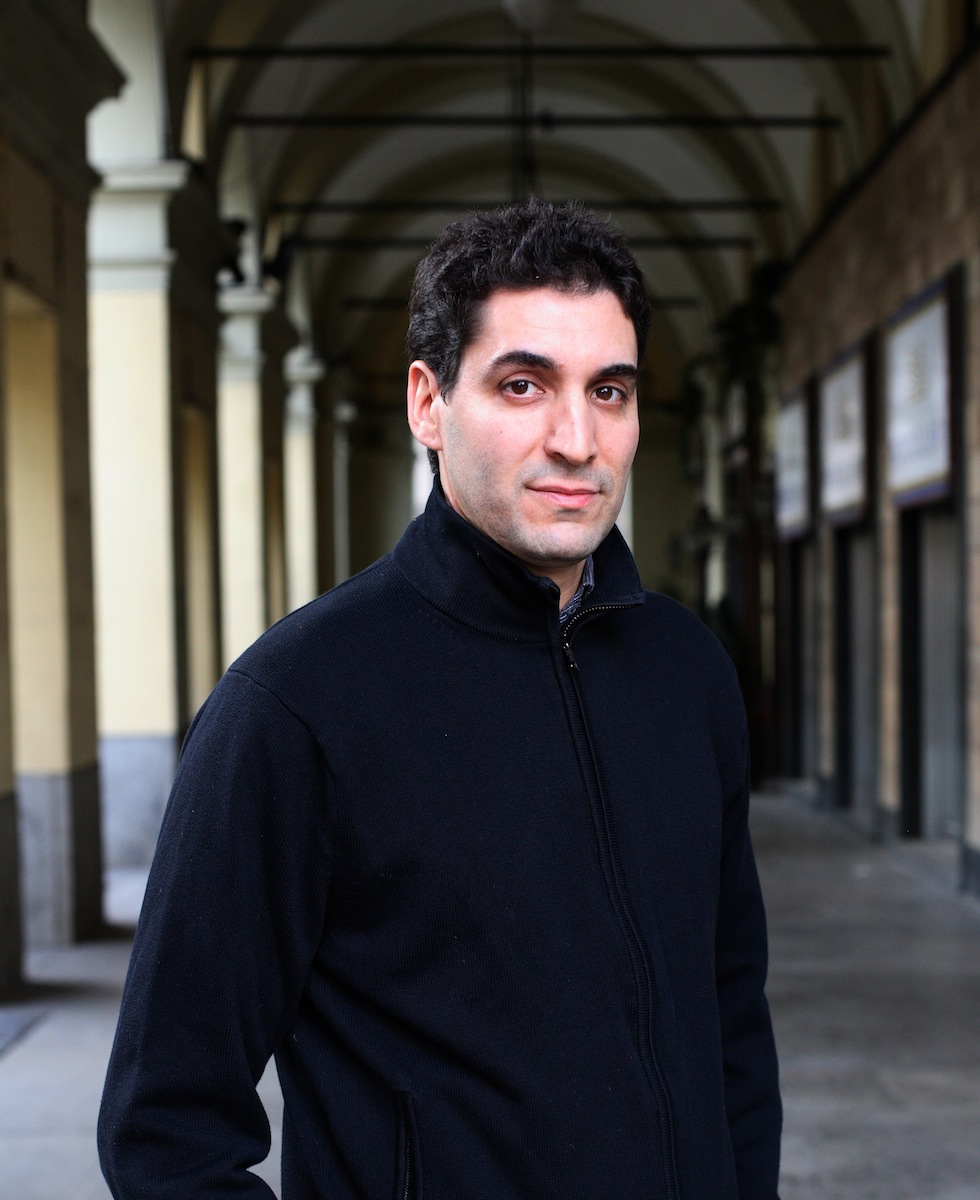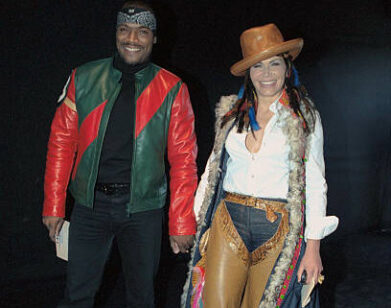Saïd Sayrafiezadeh’s Enemy Lines

ABOVE: SAÏD SAYRAFIEZADEH
We met Saïd Sayrafiezadeh at the Franklin Park Reading Series in January. He was reading the first story in his debut collection Brief Encounters with the Enemy (Dial Press) featuring Ned Frost, a boss who writes love letters to his male protégés with lines like, “My cock feels full with the thought of you in my heart.” Afterwards, while he signed his memoir When Skateboards Will Be Free, a 2010 Whiting Award winner, we had a real, live conversation—a conversation we continued when we met at Housing Works Bookstore in July to discuss the working-class world of Brief Encounters.
Sayrafiezadeh is a recipient of the 2012-2013 fiction fellowship from the Cullman Center for Scholars and Writers at the New York Public Library and an Outstanding Teaching Award at New York University, where he teaches creative writing. His work has appeared in The New Yorker, The Paris Review, Granta, McSweeney’s, and The New York Times Magazine, among other places.
ERIKA ANDERSON: Your collection is called Brief Encounters with the Enemy. Who is the enemy?
SAÏD SAYRAFIEZADEH: It’s worth noting that the title of the collection differs from the title of one of the stories: “A Brief Encounter With the Enemy.” The “enemy” exists on a few different levels. The most obvious, of course, would be the enemy in the foreign war that the United States is engaged in throughout the collection. What foreign war? What enemy? That’s up to you to decide. But there’s also the enemy that the characters must contend with in their personal lives, and which, for the most part, drive most of the plots forward, like the closeted boss who sexually harasses Rex, the lead character in the opening story. Of course, Rex himself might be considered to be the enemy—by the boss. Like everything, it depends on what your perspective is, on what side of the fence you’re standing. And finally, the enemy might be me, the author. I’m half Iranian (on my father’s side), and Iran has been in conflict with the United States for the last 35 years, so I have an acute sense of what it’s like to be looked upon as the enemy. The reader is “encountering” me briefly with these eight short stories.
ANDERSON: That makes me think of the Fox interview with Reza Aslan, where Aslan, a religious scholar, was essentially looked upon as the enemy because he is Muslim and wrote a book about Jesus. I could see that same interviewer saying to you, “With a name like Saïd Sayrafiezadeh, how can you write stories about men named Ike and Nick and Max? You’re going to take our America away from us.”
SAYRAFIEZADEH: The truth is that I’m not that far from Ike and Nick and Max. I was born in Brooklyn and raised in Pittsburgh. I’ve never been to Iran, I don’t speak the language, and, probably most important of all, my Iranian father left home when I was nine months old. That’s the extent of my connection to Iran. Once we can get past my name, we see that I’m quite American. I certainly know what it’s like to feel alienated in this country. So do Ike and Nick and Max.
ANDERSON: Your narrators mop floors at Walmart, cook in the kitchens of unknown restaurants, stock shelves in supermarkets. It’s as if they followed the decree given in the Socialist Party you grew up in.
SAYRAFIEZADEH: You’re referring to the to “turn to industry” in the late ’70s, in which the National Secretary of the Socialist Workers Party urged everyone to take an industrial job to become authentic members of the working class. What followed was the ruination of professional careers and personal lives. But we have to keep in mind that the comrades chose to take these jobs, they had other options, whereas my characters don’t. Walmart, supermarket, restaurant, these are the places of employment that are available to them. My characters are not underachievers, they aspire to great things, but they are limited by the world around them. Now, another question might be, have I followed the decree of the Socialist Workers Party by writing so intently about the working class?
ANDERSON: True. I should have asked that question. [laughs] Let’s talk about things your narrators say: “If you believe it, it will happen,” “If you give 100%, you get 100%,” “Good things happen to good people.” These statements go largely unquestioned.
SAYRAFIEZADEH: These are the platitudes we utter when we don’t know what else to say. There’s comfort in platitudes, and every so often they’re accurate, but mainly they’re hollow words. It’s a sign of how little we’re able to directly address the world around us. The language of the times reveals our avoidance.
ANDERSON: What’s at risk here? Why must everything be so hollow?
SAYRAFIEZADEH: It goes back to your previous question: no one can confront the world around them, and the language is a byproduct of that. In the case of war, we’ve come to think of it in strictly heroic terms and therefore have to spend an awful lot of energy sidestepping. But there’s a cumulative effect to sidestepping. By the time one of the characters is heading off to war, the best that can be offered is, “Kick some ass!” Anything else would require having to acknowledge the stark reality of the situation.
ANDERSON: That emptiness shows up every time your narrator is confronted with sheet cake in the face of victory or even imminent failure at these “welcome home” or “going away” work parties for the war effort.
SAYRAFIEZADEH: I don’t know if the characters are entirely aware of the emptiness of these parties, but they certainly do feel like they have to live up to something, which, at the very least is to have some “fun.” There’s always been something a little pathetic for me at the work parties I’ve attended, especially thinking back to the restaurants I worked in. I remember a Christmas party in which we all got free T-shirts with the restaurant on the front and our names on the back. Everyone was drunk and ecstatic.
ANDERSON: Throughout your collection, we are continually met with war: we will go to war at any moment; the war will end at any moment; we’re about to win; we’re about to lose. I can’t help but think of Orwell’s 1984. Was Orwell an inspiration?
SAYRAFIEZADEH: Absolutely. I first read 1984 when I was in eighth grade, and it’s haunted me ever since. The Orwellian war between superstates Eastasia, Eurasia, and Oceania seems to fit nicely with our own never-ending war, which has supposedly been on the verge of ending for at least 20 years, going back to the first Gulf War. It also reflected some of the philosophy of the Socialist Workers Party, wherein we were constantly at odds with an unflagging enemy, namely capitalists. I was taught that unless the working class rose up, war was inevitable, as was fascism and depression. These were the stakes of my childhood. But now I get to be the architect of the haunted house.
ANDERSON: In many ways, your story collection is a repudiation of the American dream. Success is a fantasy—”There was a single opportunity at having that happen in one’s life, I had missed it,” your narrators say. How does the America of your stories compare to the America the rest of us live in?
SAYRAFIEZADEH: More people work at Walmart than anywhere else in the United States, but you wouldn’t know that from our literature. I’m trying to get at the reality of this country by portraying the lives of many of my friends who I left behind in Pittsburgh. In many ways this book could be seen as a sequel to my memoir; it’s what my life would have been like if I had never moved back to New York City when I was 24. I did not have the intention of repudiating the American dream in this collection, but if the American dream is repudiated, then so be it.
ANDERSON: Your characters are hesitant, they practice what they’re going to say before they say it, they repeat others’ lines. How has working as an actor and a playwright has influenced your work?
SAYRAFIEZADEH: Some of my years spent in “rehearsal” might be spilling over into my writing. I definitely think about theater when I write: character, stage, set, prop. As a playwright, I’ve had to keep in mind that the average play has two acts and runs two hours, in much the same way that the average short story has a page length that requires the plot to be resolved in a fixed amount of space. The audience’s desires are paramount for an actor; even the way an actor stands on stage is dictated by where the audience is sitting. I think about what the audience needs and expects, and sometimes I try to subvert those expectations. I also try to eliminate any sort of overt “explanation” in my writing, the way that theater will often allow the drama to play out and give the audience space to puzzle out the answers.
ANDERSON: Speaking of puzzles, you once told Alex Gilvarry that not having a father has defined your life. Because these narrators seemed largely fatherless, not really guided at all, I can’t help but wonder if there is a connection between the two?
SAYRAFIEZADEH: When I began the collection, I was determined not to write about fathers anymore. I felt as if I’d exhausted the subject in my memoir, which was all about my father and his absence. It seems, though, that in these stories I’ve unwittingly made a statement about fathers and sons by the very fact that I’ve avoided the subject. Because it’s true, these young men have very little guidance in their lives. When their fathers are not issuing platitudes, they’re largely absent.
ANDERSON: You also told Gilvarry that the first story you remember writing was in third grade “about a son who lives alone with his mother. His father has gone off to war. Every morning the boy goes to the front door to see if his father has returned.” You said this was your memoir if you boiled it down to its essence. But isn’t that also true of your story collection?
SAYRAFIEZADEH: Oh, lord. I never thought of that. Maybe I am destined to write versions of that eight-year-old’s story forever. I hope it’s rich enough.
BRIEF ENCOUNTERS WITH THE ENEMY IS OUT TOMORROW, AUGUST 13.






